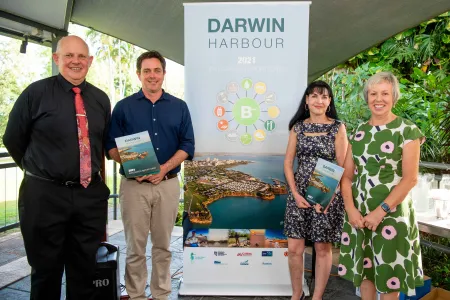News
New integrated report card to protect Darwin Harbour
Territorians will get a better insight into the health and long-term sustainability of Darwin Harbour, following the launch of the first truly integrated Darwin Harbour Report Card.
New health indicators addressing Indigenous cultural, social, economic and environmental values of Darwin Harbour and catchment were used to produce the Report Card, a joint initiative of the Darwin Harbour Advisory Committee (DHAC), Charles Darwin University (CDU), Santos, Inpex, City of Darwin, Larrakia Development Corporation and the Northern Territory Government.
A team of scientists from Charles Darwin University, University of Maryland Center for Environmental Science (UMCES), Griffith University, and the Northern Territory Government obtained data for the report card through field surveys, remote sensing, existing government reports, interviews and surveys.
A $125,000 grant was awarded to Charles Darwin University from The Ian Potter Foundation in 2019 to support the “Towards Integrated Reporting for Darwin Harbour” project and $200,000 was invested from the Northern Territory Government to support researchers to establish integrated reporting for the harbour.
The overall grade for the integrated 2021 Darwin Harbour report card was B- which revealed that indicators for clean water, management, and lifestyles and recreation scored highest, whereas indicators for sustainability and tourism scored the lowest.
A variety of stakeholders, including Indigenous Australians, were engaged in the development of the new indicators used to generate scores for 12 values identified as important in reflecting the health of Darwin Harbour and catchment.
The report card consultation process engaged Larrakia and Belyuen people throughout, ensuring that Indigenous values were represented in the new integrated Darwin Harbour Report Card. An extensive stakeholder engagement effort beginning in March 2020 was used to reformulate the existing Darwin Harbour Report Card that was based on water quality data alone.
Quotes attributable to Minister for Environment and Natural Resources Eva Lawler
“This report card will underpin the future management of Darwin Harbour, protecting and enhancing its value to the community well into the future.”
“The Darwin Harbour is the jewel of the Territory and a vital lifeline for our community generating millions to our economy and this project will ensure that it can be used by tourists, boaters and fishers for years to come.
Quotes attributable to Charles Darwin University (CDU) Professor and DHAC Project Director Karen Gibb
“The Report Card is all about the community having better insights into the health and sustainability of the harbour so that they can help influence government and key decision-making.”
“The Report Card highlights the areas of the environment that need to be improved and better managed and provides a forum where people can interrogate what’s happening in the harbour to better understand and protect it into the future.”
Quotes attributable to The Ian Potter Foundation, Chair Charles Goode
“The Foundation is pleased to have contributed funding towards this collaborative project led by Charles Darwin University that aims to ensure the future sustainability of Darwin Harbour.
“The co-designed process brought together community groups, business, researchers and government to jointly identify key indicators to measure the health of the harbour. The report card will be a practical tool to better manage this important natural asset for the benefit of the entire community.”
University of Maryland Center for Environmental Science (UMCES) Project Manager Dr Simon Costanzo (UMCES)
“The integrated Darwin Harbour report card was created by an incredible partnership in challenging times, and we are proud of this effort.”
Related Articles

First “hype cycle” of AI development put tech above humans
Users around the world have rushed to adopt artificial intelligence - especially in safety-critical fields - but a new study has revealed the hype has prioritised technology for technology’s sake instead of human-centred development.
Read more about First “hype cycle” of AI development put tech above humans
Nanoplastics hindering cognitive abilities of fish, international research shows
Nanoplastic exposure can impair the cognitive abilities of fish and could lead to significant impacts on marine species’ ability to survive, according to a new international study.
Read more about Nanoplastics hindering cognitive abilities of fish, international research shows
New project to grow Indigenous aquaculture on one of Australia’s largest islands
An Australian island’s efforts to improve food security and transition into a blue economy will be bolstered by a new project to propagate a nutritious and increasingly popular fish.
Read more about New project to grow Indigenous aquaculture on one of Australia’s largest islands
